..."I will take a certain fixed proportion of Your slaves. I will lead them astray and fill them with false hopes. I will command them and they will cut off cattle's ears. I will command them and they will change God's creation." Anyone who takes Satan as his protector in place of God has clearly lost everything.
(Quran, 4:118-119)
In the previous section we looked at the effects of romanticism resulting from "romantic nationalism." Now let us look at some of the other manifestations of romanticism to see some of those calamities it has brought upon humanity. The first ideology we must examine is one equally as appalling as romantic nationalism: that is, communism.
Communism was incepted as a supposed ideology of reason. Its founders, Karl Marx (1818-1883) and Friedrich Engels (1820-1895) had adopted the philosophy of materialism which, they thought, they could apply to the social sciences and explain the "laws of history." Marx distinguished various stages of history: advanced countries of the time, such as England, were living in the "capitalist phase." He predicted that, after this phase, there would inevitably follow a workers' revolution which would begin the socialist phase. He also predicted that this revolution would happen spontaneously, that is, arising from the initiative of the workers themselves, and that it would happen in England and other industrialised countries.
Marx's predictions did not come true, however. The fact that they would not materialise was evident within 30-40 years after his death. There was no revolution in England or in any other industrialised country; on the contrary, the social and economic conditions for workers improved.
Marx's theory, then, should be considered as one of the many historical errors committed in the name of "social science," and should therefore have been abandoned. But, such was not the case. A group of individuals styling themselves "Marxists" attempted, with difficulty, to actualise Marx's unfounded predictions. Although the revolution Marx said would happen "spontaneously" did not come about at all, Marxists sought to incite the revolution through the establishment of organisations which would bring it about by force of arms. The most important Marxist to have tried to revise the interpretation of Marx, and to make excuses for his unrealised predictions, was Lenin.
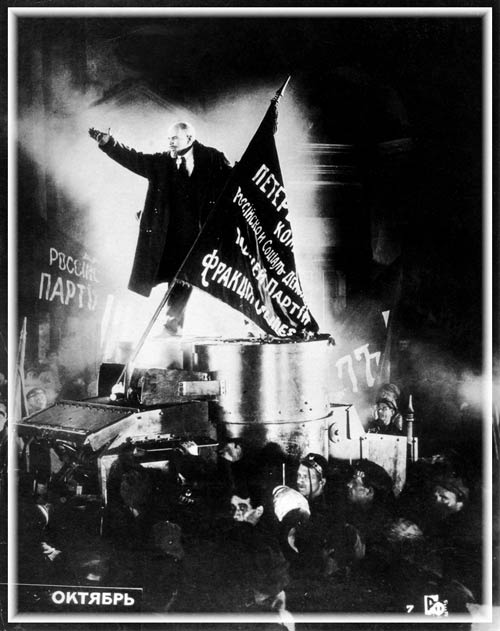 |
| The most well-known symbols of communist romanticism: the proletariat breaking its chains, figures with clenched fists, revolutionary songs defending socialism to the death. |
Lenin asserted that it was not in advanced countries such as England where the revolution would occur, but in unindustrialised countries like Russia. He said that communism would be successful there, and from there would spread throughout the whole world. To realize his dream, he spent many years, both inside and outside Russia, making preparations for the revolution. The opportunity for him to come to power arose from the confusion caused by World War l.
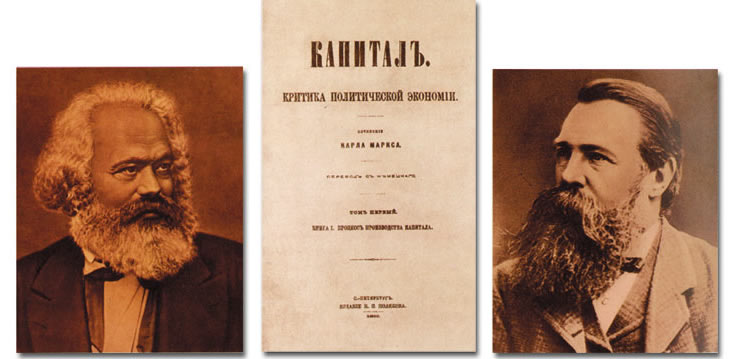 |
| The fathers of communism: Marx (left) and Engels (right). In the middle is a translation into Russian of Marx's Das Kapital. |
Lenin's predictions, like those of Marx, came to nothing. Neither was the system he founded successful, nor did communism spread throughout the world. Today, the Soviet Union that Lenin founded has drifted into history, and the communist system it forced on those countries it occupied has collapsed everywhere. It is accepted that communism was the gravest and most unsuccessful political experiment of the twentieth century.
That Marxism was flawed has been proven, not only by its unfulfilled promises, and the collapse of the system it gave rise to, but also by the failure of the philosophy it was based on. The basic premises of the materialist philosophy, which is the basis of Marxism, have been discredited by the scientific discoveries of the twentieth century. For example:
 |
| People who set themselves on fire for the sake of an idea or an ideology are actually possessed by an extreme form emotionalism. Because they fail to think rationally, they tend to react by committing acts which they falsely deem to be courageous. |
If an ideology claims to be rational, but its claims do not stand up to the scrutiny of reason or science and, furthermore, if the plain facts do not bear witness to its validity, then that ideology's claims must be rejected. Those who have adopted this ideology must subject it to rational inquiry, and would then discover its invalidity and abandon it. If communists were people who used reason, logic and common sense instead of living in a romantic dream-world, communism would have been discredited hundreds of times by now.
Because the foundation of communism rests on romanticism, those who continue to espouse it can do so only contrary to the warrant of reason and science, and can defend it only with their eyes closed to the fact that it is obsolete as an ideology. Already when it was found that the basic predictions of Marxism were not going to be realised, it should have been put aside. However, it was not abandoned. Revolutionary movements have sprung up all over the world, trying to make Marxist dreams a reality by means of revolution, civil war, guerrilla struggle and terror means of attack.
The Soviet Union and the whole of the Eastern Block collapsed, Red China adopted a capitalist economic system. However, communism has still not been abandoned. Even today, throughout the world, communist organizations continue their activities. Despite the fact that they must know that the "revolution" they speak of is a fantasy, they continue to shed blood, just so as to not have to abandon communism. They frenziedly set themselves as well as their comrades on fire, as they sing communist marching songs, romantically, blindly and stubbornly holding on to their antiquated ideology.
This shows that communism is not an ideology based on reason, and that those who espouse it do so for reasons arising from something other than from a rational commitment to it. Many would regard the reason for such a commitment to merely be "fanaticism," "bigotry," or obsession called an "idee fixe." Upon further investigation, it becomes apparent that beneath this supposed fanaticism lies the tremendous influence of romanticism.
That is, communism also derives strength from the spell of romanticism.
Initially, people are usually not aware of communism's romantic spirit, because communists always speak in terms of science, philosophy and rationality. However, communists develop their ideas out of a romantic outlook. In fact, they blindly reject those scientific findings, which do not fit their purposes, as "bourgeois." Stalin went even to the point of systematising this prejudice by creating an absurd distinction between "bourgeois" and "proletariat" science.
On the other hand, if we were to look in detail at communist publications, magazines, poetry or marching songs, we would discover that their ideology is bound tightly to romanticism. They have idolized certain ideas, developing excessive emotional attachment to them. The most important of these is the notion of "revolution." For a communist, revolution is the end of all evil and the beginning of everything good. They are hopelessly enthralled with a fantasy they know will never be realized. They do not attempt to examine their idea of "revolution" rationally, nor ask, for example, "For what purpose should the revolution be sought?" "What is the justification of a revolution in which masses of innocent people will be killed and the whole of society suffer?" "Can the living conditions of the poor not be improved without revolution?" "How will it affect the economy?" "How will the country then be governed, its inner conflicts resolved, and external threats be removed?"
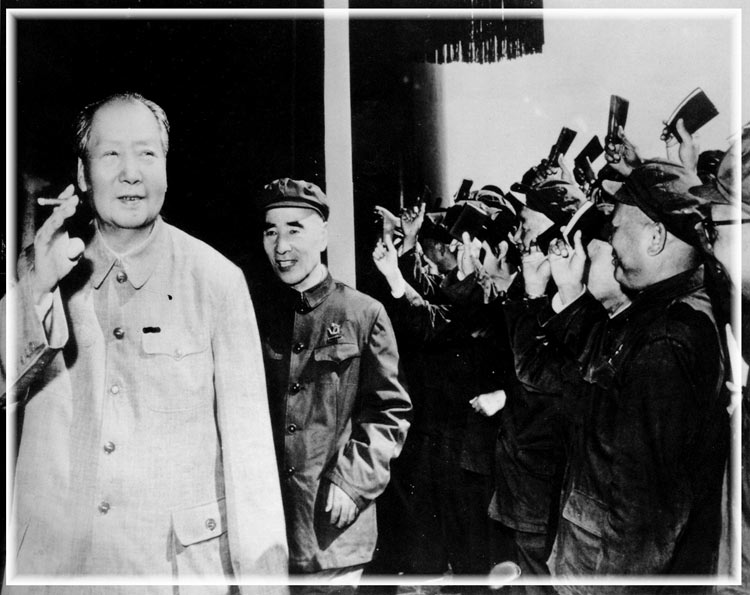 |
| One of the most disturbing aspects of communism was its attempt to present its leaders as figures with super-human qualities, working on behalf of the people, regardless of the fact that in reality they were criminals responsible for the death of millions of people. The purpose of this sort of propaganda was to entice people to feel an emotional attachment to their leaders, and thereby, to pardon their crimes |
A communist does not see these questions as having any importance; his only goal is revolution. If he is to provide an answer to any of these questions, he will quote the typical and oft-repeated phrases from the books of Lenin, Stalin or Mao, but he will not himself think rationally for answers to these questions. What binds him most dearly to the idea of revolution are the emotive poems written or passionate marching songs sung of revolution. Communist literature frequently speaks of "the beautiful country covered in flowers" and "the red sun on the horizon." Actually, the relationship between a communist and his idea of revolution is comparable to a romantic love-story. There are communist booths at universities, book-fairs, and cultural centres; if you go into any of them, or into a communist bar or cafe, there you will see the many symbols used to give fervour to this romanticism. Posters of a mighty proletariat breaking his chains, figures with clenched fists, revolutionary songs about the struggle to the death for socialism, are the most common symbols of the romantic communist.
This romanticism is also sometimes reflected in the attire of the communists. A young communist will often been seen wearing a khaki parka and commando cap, identifying himself with the Latin American communist guerrilla Che Guevara, and no doubt in his room, among his personal possessions, you will find a poster of "Che." The only difference between him and a college student romantically obsessed with a Pop star, is the kind of star he has chosen; his is not a musician but a guerrilla fighter.
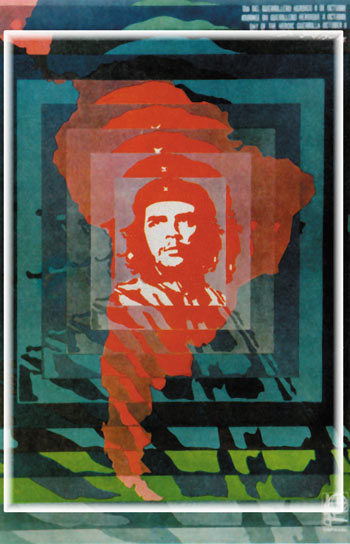 | 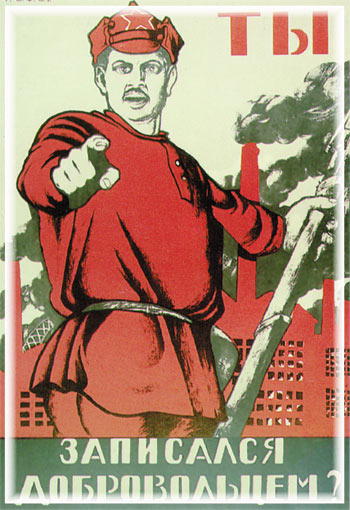 |
| This poster is typical of Communist Romanticism's symbolism. These posters served to strengthen the emotional attachment the people have for their leader and his ideology. |  |
Another interesting example to consider of communism's romanticism is the great delight they take in causing themselves pain and in making people feel sorry for them. For example, a communist militant might begin a "hunger strike" in prison, prepared to starve himself to death to achieve some petty goal. On the one hand, he feels pleasure in the pain that it causes him, and enjoys the sympathy others feel for him and his plight, while, on the other hand, he takes pride in being recognised among his friends as "hero."
The romantic pleasure that communists take in their pain can sometimes attain very high levels. Communists have committed some frighteningly savage acts in their demonstrations; for example, they have lit themselves on fire, they have tied one selected from their number to iron bars, poured inflammable liquid over him, set him on fire, and sung communist marching songs as he burned. As discernible from recorded images, the militants who perform these mindless acts of savagery are much like the crowds of Nazi gatherings; they undergo a "lapse of consciousness" and are captivated by an emotional and psychological trance.
It is possible only stubbornly for a communist to remain firmly devoted to his ideology, knowing that its ideals will never be implemented. This blind commitment to ideology is demonstrated in vaunts such as: "I don't care if it's wrong, I don't care if we are successful or not, I am a communist and I will be until I die." Certainly, a rational person would not behave in such a way. This blind dedication is like the kind of madness seen in the obsessive desire of a man for a woman who has deceived and humiliated him, but who, despite it all, refuses to stop loving her.
It has been demonstrated then, that communism is simply an element of the weapon of romanticism used by Satan to rob human beings of their reason, and to alienate them from faith in God. Despite its claim to be a rational philosophy and ideology, communism is rife with ideas that run contrary to simple reason and science. At least a century has now passed during which communists have continued to doggedly defend their ideology, making it clear that their devotion to the cause is a romantic one.
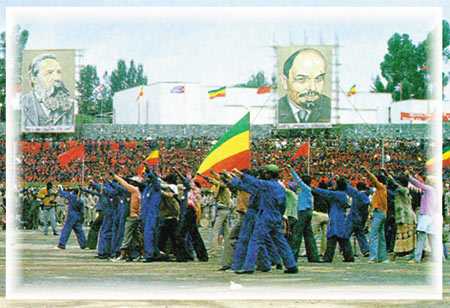 | 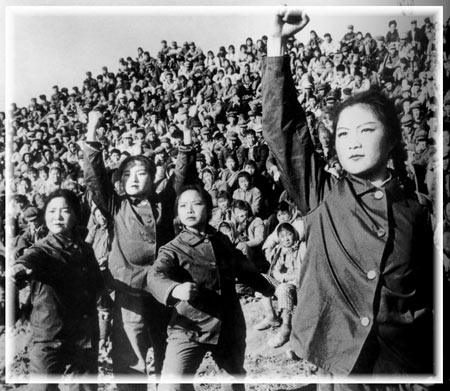 |
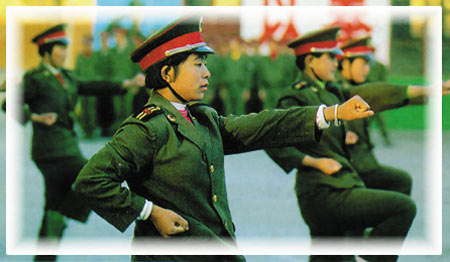 | The psychology of the people gathered in the large communist rallies in Red China and Soviet Russia, was actually no different from that of the people in Hitler's Germany. The force that drew them unconsciously into partisanship was their subliminal romanticism. |